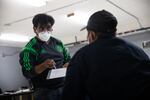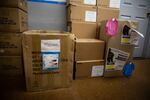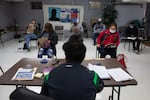Dagoberto Morales’ calling came louder and more clearly after September’s Almeda fire burned through Southern Oregon.
He’d already spent 25 years as a volunteer, helping uplift farmworkers and Latino immigrants in the Medford area. But after the fire, Morales decided what he’d been doing wasn’t enough.
So he quit his job at a local mill and started working full time with the organization he co-founded, Únete Center for Farm Workers and Immigrant Advocacy.
Before the fire, Morales spent his volunteer time working with Latino people new to the area, helping them acquire skills that would help them get better jobs and get more established in the community.

Dagoberto Morales writes down a student's contact information at the Únete Center for Farmworker Advocacy in Medford, Oregon, Sunday, April 25, 2021. Únete bases the assistance it provides community members on their needs.
Bradley W. Parks / OPB
And with the nonprofit world’s growing commitment to more equitably supporting diverse communities, Morales and Únete are expanding these efforts through classes on English, computer and online skills, and other services.
“We bought new equipment for the classes. And since everything is through Zoom, and there are people who don’t know how to use Zoom, they come to the office since we have a large space and do the class here,” Morales said through an interpreter.
The idea, Morales said, is that one of the best ways to provide wildfire relief is to double down on community-building.
“We don’t want to continue to just give them food or clothes anymore,” Morales said. “Instead, we’re thinking how can we help them get better jobs? What can we do so they can develop new skills? And that’s what we’ve been doing, is starting these little workshops.”
Throughout Western Oregon, 2,000 families sought emergency shelter after being displaced by the September wildfires. More than 5,000 structures and homes burned down. Many communities are still struggling to get back on their feet — and the Latino community was hit especially hard in Southern Oregon.
Disaster relief and emergency response programs aren’t built to last for months and most of the time, many of those funds go to white-led organizations and are not evenly distributed throughout all affected communities. In Oregon, thousands of Federal Emergency Management Agency applications were denied and knowing where else to get assistance from other resources can be difficult — even more so if it requires being proficient in English.
Unrestricted funding
A month after the wildfires, the United Way of the Columbia-Willamette created the Wildfire Response and Recovery Fund to bring more inclusivity to the work of nonprofits serving diverse communities, program manager Cristy Muñoz said.
“We’ve pivoted towards really trying to prioritize and bring a lot of people to the table to push racial equity forward and center it in a lot of different departments,” Muñoz said. “That really helped us just move this a lot faster.”
While deciding which organizations to support, the United Way was hearing from its community partners that Black, Indigenous and people of color were disproportionately impacted by the wildfires, Muñoz said.
A critical feature of the new fund, when it comes to supporting historically underrepresented people of color, is that grant recipients have the latitude to decide how to support their communities.
“That could be anything. That could be like basic needs to buying food cards to hotel vouchers to whatever it is that you needed,” Muñoz said. “Including potentially like, additional monetary support for their staff, that some of them were working 10-hour days seven days a week during the fires.”
So far, Únete and 16 other organizations statewide have received grants from the United Way of the Columbia-Willamette’s Wildfire Response and Recovery Fund.

A box of KN95 masks is available at the Únete Center for Farmworker Advocacy in Medford, Oregon, Sunday, April 25, 2021.
Bradley W. Parks / OPB
Únete’s role in deciding how best to distribute charitable aid is part of a larger, nationwide trend that prioritizes the needs of communities of color.
Philanthropy + equity and inclusion = #trending
Lori Villarosa has been tracking a recent upsurge in giving that seeks to undo decades of racial inequity. She’s the founder and executive director of the Philanthropic Initiative for Racial Equity. The organization has worked with funders and nonprofits for 20 years.
Villarosa said this trend really took off last year. The COVID-19 pandemic had further exposed racial inequities, and George Floyd’s murder, along with the violent deaths of other African Americans, reenergized the Black Lives Matter movement and put a spotlight on police killings and brutality against people of color.
Villarosa said the big question now is whether this push for equity and inclusion in the nonprofit world will be sustained.
“Philanthropy is notoriously faddish and trendy and following trends and it’s problematic,” Villarosa said. “However, the trajectory around understanding the importance of tackling racial equity and racial justice and the power that lies within investing in Black and brown and Indigenous communities has gotten enough momentum and enough traction that I don’t believe we are going to lose it completely.”
Villarosa is also monitoring trends about where money that is intended to be for racial equity is actually going.
“Way more money is still going to predominantly white organizations to do racial equity work, which is a trend that we need to also watch out for,” she cautioned.
It’s also a concern to Tanya Gulliver-Garcia, the director of learning and partnerships for the Center for Disaster Philanthropy. She said white-led institutions can’t adequately address their role in perpetuating inequities by simply writing checks.
“I think we are seeing an overall trend of funders recognizing the need to be more equitable. Most foundations and funders would argue that this is what they have always done,” she said. “But what that meant was, that they gave to groups in a community and just hoped that those who were most affected or those who were most in need got served.”
Gulliver-Garcia said history shows how disasters often hit communities of color and poorer neighborhoods disproportionately because of inequities that exist before the weather gets extreme or fires burn.
She pointed to the Chicago heat wave of 1995 when more than 700 people died — mostly poor, elderly and Black people. Hurricane Katrina in 2005 resulted in about 1,800 fatalities. A disproportionate number claimed Black lives.
Gulliver-Garcia said both incidents elevated the public’s awareness of inequality in how natural events become disasters for some communities. And yet, the racial and economic divide has yet to be eliminated.
She praised efforts like the United Way of the Columbia-Willamette’s to distribute unrestricted dollars to frontline organizations within communities of color. She said it is uncommon to see a fund that is focused and targeted to a specific at-risk or vulnerable population with no strings attached.
“We still need accountability to our donors, we still need to be able to tell the story to generate more money,” she said. “But we also need to trust our grantees and in these cases to trust individuals to do what they need.”
Building relationships and trust
Unite Oregon is a statewide nonprofit organization that helps underserved communities and people of color, including refugees and immigrants for whom English is not a first language. When the September wildfires hit, the organization quickly started to help displaced community members throughout the region. It was among the first on-the-ground organizations to distribute charitable aid that came from the United Way’s new equity-focused fund.
Director for the Clackamas County Chapter Jairaj Singh said his group directed those dollars to help cover people’s relocation costs and living expenses while they looked for new jobs. But after conducting a few focus groups, Unite Oregon discovered a lack of what he called “one-stop-shop assistance.”
“Instead of having to go to churches or other mutual aid places, I think there’s just a need for more trustworthy organizations in the county,” he said.
Virginia Camberos, director for the Rogue Valley Chapter of Unite Oregon, said building trust with diverse communities is critical. And because her organization was working on this before the fires, it was well-positioned to partner with the United Way to get recovery help to people in ways that go beyond sending them to food pantries.
“We need to let them know that they can buy what they feel is important for them,” she said. “It could be these are folks that probably don’t have any undergarments, they don’t have shampoo or soap or toothpaste.”
But resupplying people with necessary items doesn’t end the struggle for those recovering from the fires, Camberos said.
Finding new work and looking for new places to live requires people to be able to get around and communicate. And for many non-English speaking residents in rural areas, language help is crucial for passing driver’s license exams.
“Our folks are not passing their tests, their written tests, because of the way of the translation,” Camberos said.
Looking forward
That’s something Dagoberto Morales’ Únete is working on. Every Sunday between 5 p.m. and 7 p.m., Morales teaches a small class of non-English-speaking students how to pass their written exam for their driver’s license. He’s been teaching this class since 1996. It’s one of four classes offered by Únete.

Dagoberto Morales instructs a driver's education course at the Únete Center for Farmworker Advocacy in Medford, Oregon, Sunday, April 25, 2021.
Bradley W. Parks / OPB
It also distributes about 60 plates of food for families in need. It’s a start, Morales said, and he’s hoping to expand into children’s services with a hands-on outdoor class and a van for helping transport kids.
Rosa Reyes is one of the people who has put her trust in Morales and Únete to help her family recover from the Almeda wildfire. They lost their home of 20 years in Medford, along with their car, to the Almeda fire. Since then, the Reyeses have lived in four different places, each time paying a high price for rent as the region’s housing prices skyrocket. Reyes said she has requested gas cards from Únete when she needs them and picks up free meals from time to time.
Reyes’ next step might be to help fulfill the kind of community-building vision that Morales sees as the most effective form of disaster recovery: She’s thinking about becoming an Únete volunteer, helping others while she improves her own English skills and learn more about wildfire preparedness.
“I’ll be part of the team,” she said through an interpreter. “I’ll be moving forward in a positive direction and fighting for something.”
